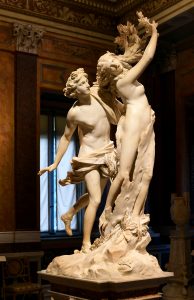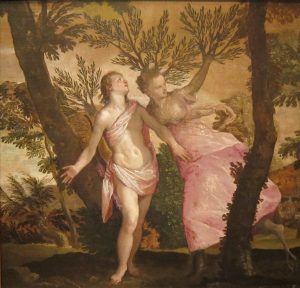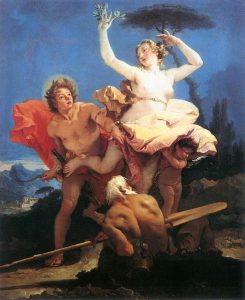9 Lycaon and Daphne from Ovid
Lycaon
Bk I:199-243 Lycaon is turned into a wolf
All the gods murmured aloud and, zealously and eagerly, demanded punishment of the man who committed such actions. When the impious band of conspirators were burning to drown the name of Rome in Caesar’s blood, the human race was suddenly terrified by fear of just such a disaster, and the whole world shuddered with horror. Your subjects’ loyalty is no less pleasing to you, Augustus, than theirs was to Jupiter. After he had checked their murmuring with voice and gesture, they were all silent. When the noise had subsided, quieted by his royal authority, Jupiter again broke the silence with these words: ‘Have no fear, he has indeed been punished, but I will tell you his crime, and what the penalty was. News of these evil times had reached my ears. Hoping it false I left Olympus’s heights, and travelled the earth, a god in human form. It would take too long to tell what wickedness I found everywhere. Those rumours were even milder than the truth. I had crossed Maenala, those mountains bristling with wild beasts’ lairs, Cyllene, and the pinewoods of chill Lycaeus. Then, as the last shadows gave way to night, I entered the inhospitable house of the Arcadian king. I gave them signs that a god had come, and the people began to worship me. At first Lycaon ridiculed their piety, then exclaimed ‘I will prove by a straightforward test whether he is a god or a mortal. The truth will not be in doubt.’ He planned to destroy me in the depths of sleep, unexpectedly, by night. That is how he resolved to prove the truth. Not satisfied with this he took a hostage sent by the Molossi, opened his throat with a knife, and made some of the still warm limbs tender in seething water, roasting others in the fire. No sooner were these placed on the table than I brought the roof down on the household gods, with my avenging flames, those gods worthy of such a master. He himself ran in terror, and reaching the silent fields howled aloud, frustrated of speech. Foaming at the mouth, and greedy as ever for killing, he turned against the sheep, still delighting in blood. His clothes became bristling hair, his arms became legs. He was a wolf, but kept some vestige of his former shape. There were the same grey hairs, the same violent face, the same glittering eyes, the same savage image. One house has fallen, but others deserve to also. Wherever the earth extends the avenging furies rule. You would think men were sworn to crime! Let them all pay the penalty they deserve, and quickly. That is my intent.’
Daphne
Bk I:438-472 Phoebus kills the Python and sees Daphne
Indeed, though she would not have desired to, she then gave birth to you, great Python, covering so great an area of the mountain slopes, a snake not known before, a terror to the new race of men. The archer god, with lethal shafts that he had only used before on fleeing red deer and roe deer, with a thousand arrows, almost emptying his quiver, destroyed the creature, the venom running out from its black wounds. Then he founded the sacred Pythian games, celebrated by contests, named from the serpent he had conquered. There the young winners in boxing, in foot and chariot racing, were honoured with oak wreaths. There was no laurel as

yet, so Phoebus crowned his temples, his handsome curling hair, with leaves of any tree.
Phoebus’s first love was Daphne, daughter of Peneus, and not through chance but because of Cupid’s fierce anger. Recently the Delian god, exulting at his victory over the serpent, had seen him bending his tightly strung bow and said ‘Impudent boy, what are you doing with a man’s weapons? That one is suited to my shoulders, since I can hit wild beasts of a certainty, and wound my enemies, and not long ago destroyed with countless arrows the swollen Python that covered many acres with its plague-ridden belly. You should be intent on stirring the concealed fires of love with your burning brand, not laying claim to my glories!’ Venus’s son replied ‘You may hit every other thing Phoebus, but my bow will strike you: to the degree that all living creatures are less than gods, by that degree is your glory less than mine.’ He spoke, and striking the air fiercely with beating wings, he landed on the shady peak of Parnassus, and took two arrows with opposite effects from his full quiver: one kindles love, the other dispels it. The one that kindles is golden with a sharp glistening point, the one that dispels is blunt with lead beneath its shaft. With the second he transfixed Peneus’s daughter, but with the first he wounded Apollo piercing him to the marrow of his bones.
Bk I: 473-503 Phoebus pursues Daphne
Now the one loved, and the other fled from love’s name, taking delight in the depths of the woods, and the skins of the wild beasts she caught, emulating virgin Phoebe, a careless ribbon holding back her hair. Many courted her, but she, averse to being wooed, free from men and unable to endure them, roamed the pathless woods, careless of Hymen or Amor, or whatever marriage might be. Her father often said ‘Girl you owe me a son-in-law’, and again often ‘Daughter, you owe me grandsons.’ But, hating the wedding torch as if it smacked of crime she would blush red with shame all over her beautiful face, and clinging to her father’s neck with coaxing arms, she would say ‘ Dearest father, let me be a virgin for ever! Diana’s father granted it to her.’ He yields to that plea, but your beauty itself, Daphne, prevents your wish, and your loveliness opposes your prayer.
Phoebus loves her at first sight, and desires to wed her, and hopes for what he desires, but his own oracular powers fail him. As the light stubble of an empty cornfield blazes; as sparks fire a hedge when a traveller, by mischance, lets them get too close, or forgets them in the morning; so the god was altered by the flames, and all his heart burned, feeding his useless desire with hope. He sees her disordered hair hanging about her neck and sighs ‘What if it were properly dressed?’ He gazes at her eyes sparkling with the brightness of starlight. He gazes on her lips, where mere gazing does not satisfy. He praises her wrists and hands and fingers, and her arms bare to the shoulder: whatever is hidden, he imagines more beautiful. But she flees swifter than the lightest breath of air, and resists his words calling her back again.
Bk I:504-524 Phoebus begs Daphne to yield to him
‘Wait nymph, daughter of Peneus, I beg you! I who am chasing you am not your enemy. Nymph, Wait! This is the way a sheep

runs from the wolf, a deer from the mountain lion, and a dove with fluttering wings flies from the eagle: everything flies from its foes, but it is love that is driving me to follow you! Pity me! I am afraid you might fall headlong or thorns undeservedly scar your legs and I be a cause of grief to you! These are rough places you run through. Slow down, I ask you, check your flight, and I too will slow. At least enquire whom it is you have charmed. I am no mountain man, no shepherd, no rough guardian of the herds and flocks. Rash girl, you do not know, you cannot realise, who you run from, and so you run. Delphi’s lands are mine, Claros and Tenedos, and Patara acknowledges me king. Jupiter is my father. Through me what was, what is, and what will be, are revealed. Through me strings sound in harmony, to song. My aim is certain, but an arrow truer than mine, has wounded my free heart! The whole world calls me the bringer of aid; medicine is my invention; my power is in herbs. But love cannot be healed by any herb, nor can the arts that cure others cure their lord!’
Bk I:525-552 Daphne becomes the laurel bough
He would have said more as timid Peneïs ran, still lovely to see, leaving him with his words unfinished. The winds bared her body, the opposing breezes in her way fluttered her clothes, and the light airs threw her streaming hair behind her, her beauty enhanced by flight. But the young god could no longer waste time on further blandishments, urged on by Amor, he ran on at full speed. Like a hound of Gaul starting a hare in an empty field, that heads for its prey, she for safety: he, seeming about to clutch her, thinks now, or now, he has her fast, grazing her heels with his outstretched jaws, while she uncertain whether she is already caught, escaping his bite, spurts from the muzzle touching her. So the virgin and the god: he driven by desire, she by fear. He ran faster, Amor giving him wings, and allowed her no rest, hung on her fleeing shoulders, breathed on the hair flying round her neck. Her strength was gone, she grew pale, overcome by the effort of her rapid flight, and seeing Peneus’s waters near cried out ‘Help me father! If your streams have divine powers change me, destroy this beauty that pleases too well!’ Her prayer was scarcely done when a heavy numbness seized her limbs, thin bark closed over her breast, her hair turned into leaves, her arms into branches, her feet so swift a moment ago stuck fast in slow-growing roots, her face was lost in the canopy. Only her shining beauty was left.
Bk I:553-567 Phoebus honours Daphne
Even like this Phoebus loved her and, placing his hand against the trunk, he felt her heart still quivering under the new bark. He

clasped the branches as if they were parts of human arms, and kissed the wood. But even the wood shrank from his kisses, and the god said ‘Since you cannot be my bride, you must be my tree! Laurel, with you my hair will be wreathed, with you my lyre, with you my quiver. You will go with the Roman generals when joyful voices acclaim their triumph, and the Capitol witnesses their long processions. You will stand outside Augustus’s doorposts, a faithful guardian, and keep watch over the crown of oak between them. And just as my head with its uncropped hair is always young, so you also will wear the beauty of undying leaves.’ Paean had done: the laurel bowed her newly made branches, and seemed to shake her leafy crown like a head giving consent.
Source: Ovid’s Metamorphoses, translated by Anthony S. Kline (https://ovid.lib.virginia.edu/trans/Metamorph.htm)